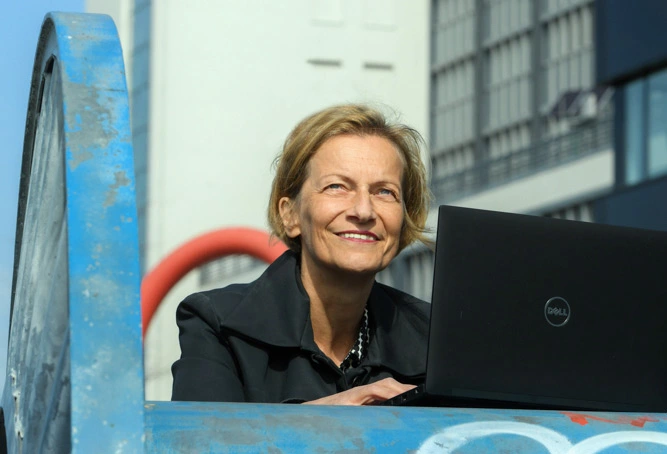Firmly rooted in the district
HTW Berlin, the University of Applied Sciences for Engineering and Economics, focuses on knowledge transfer, exchange and cooperation in Treptow-Köpenick
How do new shops affect the number of pedestrians and cars? How many cyclists really use a new bike path? Does a lower speed limit manage to curtail fine dust pollution? These are key issues for environmental agencies as well as city and traffic planners seeking to improve infrastructures and the well-being of the population. Soon they will be able to get answers in the form of simple and effective real-time data.
Olga Willner of HTW Berlin, the University of Applied Sciences for Engineering and Economics, is working on making novel technologies fit for these applications. This includes PaxCounter, a device measuring numbers of people based on the wifi signal of smartphones. ‘We have the technical basis, but it is often sophisticated and expensive. Together with our partners at Beuth Hochschule für Technik Berlin and other industry partners, we are developing them with the aim of integrating them into an “internet of things”’, the professor for business information systems elaborates. This means one thing in particular: the systems must be made smaller and far more energy efficient. Using efficient and cheap microcontrollers and smart algorithms, the data are processed as much as possible on the device and then transmitted to the backend using narrow-band technology, such as long-range wide-area networks (LoRaWan). This has nothing to do with surveillance; the device is all about anonymous figures and privacy-friendly.
In addition to the technical developments, WISTA Management GmbH and the Treptow-Köpenick district administration, the project’s two most important partners, have set up two trial areas to install and test the measurement devices, one in the Technology Park Adlershof and one on Dörpfeldstrasse in Adlershof. ‘We are firmly rooted in the district. Close exchange and cooperation are very important to us,’ says Willner. In everything she does, she has her students in mind, who often meet potential future employers during these projects. The technologies they develop are made available based on open source and open data principles.
‘These technology transfer activities are part of who we are as a university,’ says Gisela Hüttinger, who is responsible for technology transfer and project communication at HTW. Stefanie Molthagen-Schnöring, quite deliberately, carries the title of vice-president for research and transfer. She also started Company Thursday, an event created just for herself to visit and get to know companies in the region. ‘It is important to be visible in the area and signalise: we come to see you,’ says Hüttinger. The university is currently discussing a transfer strategy. Under the headline ‘Taking over responsibility for the region,’ it is also hosting events aimed at starting a conversation between the university, on the one hand, and businesses, policymakers, and the public, on the other.
A proven example is the ‘Innovation Workshop’, an event that brings together companies with a specific research need with students from various disciplines to work on business cases. Assisted by coaches, participants engage in classic project work, including brainstorming, building prototypes, documentation, and presentation. Following a highly successful testing period, the event format will be used in teaching during the coming summer semester. The newest event, ‘Spreetalks’, has been taking place since February 2020. The first topic was ‘What will life in Berlin be like in 2030?’ One-hundred interested people from science, business, and the neighbourhood engaged in a public dialogue on the needs of their district and the opportunities of researchers to contribute solutions. ‘On 28 May 2020, we are planning an event on “modern work” – certainly in a different setting than usual due to the pandemic. But I am confident that we will find a good setting,’ says Hüttinger.
The work of Florian Koch also focuses on real-life topics. The HTW professor is an expert for the real estate industry with a focus on urban development and smart cities. He is cooperating with Treptow-Köpenick’s district administration to help them achieve the United Nation’s sustainability goals on a local level. The first three goals - ‘no poverty’, ‘zero hunger’, ‘good health’ – are resulting in measures to fight poverty among young people, to make food in primary schools better and organic, and to reduce fine dust pollution. Additionally, the goal is to reduce crime, particularly – due to its local relevance – extreme right-wing crimes. By the end of the year, it is planned to set up a monitoring system, enabling the local government and the public to track the progress made in implementing the goals.
By Dr. Uta Deffke for Potenzial – The WISTA Magazine
